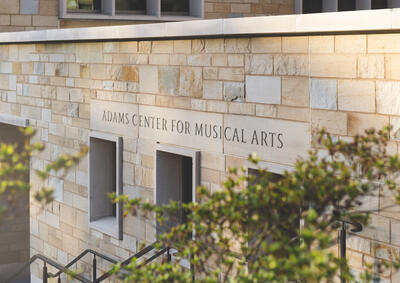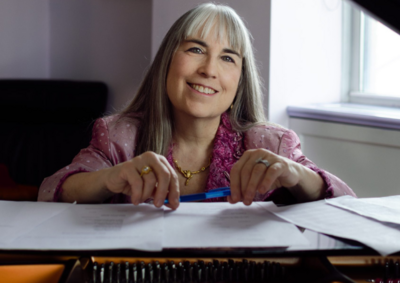Alumni spotlight: pianist Mei Rui
Meet pianist and professor Dr. Mei Rui ’06BA ’06MM ’07AD. In addition to sharing the concert stage with such renowned artists as violinist Itzhak Perlman, Dr. Rui, who earned a doctor-of-musical-arts degree from Stony Brook University, serves as Assistant Professor of Music Medicine in the neurosurgery department at MD Cancer Center at the University of Texas. In the early part of the COVID-19 pandemic, Dr. Rui helped organize the MUSICARE Initiative, through which Houston Symphony musicians performed for patients in the ICU. We spoke with Dr. Rui, who completed Yale’s unique B.A./M.M. degree and earned an artist diploma at YSM, about life and creativity at the intersection of art and science.
Q: How did Yale’s B.A./M.M. degree program prepare you for a career that connects music and science?
I feel extraordinarily fortunate to have been part of the rigorous B.A./M.M. program, where I learned to make meaningful connections between two distinct fields—molecular biophysics and biochemistry and music. There is an incredible amount of preparation and training required to be a scientist and a musician at an elite level. Both demand high levels of creativity and perseverance, deliberate practice, experimentation, ambidexterity, and meticulous attention and sensitivity to details. I feel profoundly grateful to my mentors and wonderful support networks both at YSM and Jonathan Edwards College—my residential college, where I crammed in a lot of my practice at 2 a.m. Admittedly it was a constant balancing act. The combined workload for the B.A./M.M. program was extremely daunting—I think I took seven credits for a couple of semesters when I didn’t want to give up chamber music. I learned to survive on three to four hours of sleep, find equilibrium outside my comfort zone while juggling multidisciplinary demands, and reset priorities and expectations regularly. I had an unfortunate biking accident racing down Science Hill and eating a sandwich in a sleep-deprived haze while trying to make it to my Tchaikovsky Trio coaching on time, and that was the last time I tried to multitask on the bike! Other than that scary incident, I made some incredible memories and discoveries during those five formative years. Where else can you move so seamlessly from having an inspiring lesson on Schubert D. 960 with Claude Frank to learning about intricate protein folding from the author of our biochemistry textbook (Dr. Donald Engelman), discussing Dostoevsky and Tolstoy with a world-renowned Slavic literature scholar (Dr. Vladimir Alexandrov), and performing Rachmaninoff’s Piano Concerto No. 3 with YSO all in one day? Surviving those five years helped me gain the confidence to believe that many of us who are passionate about pursuing traditionally unrelated career paths can successfully synchronize these disparate elements that drive us intellectually to make us who we are, even in a world where early specialization and a focused career trajectory are the norm. I have over the years taught and mentored over a dozen students who successfully went on to pursue double degrees in music and another discipline. As sensitive musicians we instinctively feel and react to the world around us so deeply and empathically, and on top of that so many of us are hopeless perfectionists, which makes us even more susceptible to burnout and self-criticism in acute-stress and competitive professional arenas such as medicine and research, where there is very little room or time to dwell on failures and rejections. My experience at Yale definitely made me more resilient in challenging situations.
Q: What did you learn anew about the power of music through performing for patients in the ICU during the early stage of the COVID-19 pandemic?
Founding the MUSICARE Initiative and playing for patients the ICU allowed me to witness firsthand music's powerful and universal ability to heal and connect with individuals from diverse backgrounds and brighten their days without the need for extravagant resources. During the height of the COVID-19 pandemic, all of our ICUs were overfilled. Most of the providers I was collaborating with were suffering from burnout and extreme exhaustion. Witnessing firsthand how lonely and dehumanizing it was for patients isolated in the ICU, I felt compelled to come up with an immediate and creative strategy to help alleviate their suffering and bring a small dose of peace and beauty to an aesthetically sterile environment, where they had zero control or access to seeking comfort from their love ones. Our mental wellbeing, mood, and overall outlook on life exert a significant impact on our immunological responses and our ability to fight off an infection, as our previous studies showed that in critically ill ICU patients, 60-minutes of exposure to slow movements of Mozart Piano sonatas significantly increased serum-level growth-hormone production that promotes healing, and reduced stress biomarkers such as interleukin-6. I reached out to many friends and mentors in the music world, and collaborated with ICU physicians, nurses, and surgeons in my department to launch the MUSICARE (Musicians United for Service in Care) Initiative, which brought over 400 bedside concerts to bring human connection and solace to isolated patients and providers in five ICUs. I was amazed by the outpouring of generosity and kindness from so many incredible musicians including Emanuel Ax, Yo-Yo Ma, Roger Tapping, Donald Weilerstein, and many musicians in the Houston Symphony. The therapeutic impact from those intimate bedside concerts was immediate and visible: Patients who had been sedated and unable or unwilling to engage with the staff started opening their eyes and smiling. I remember working with one transplant patient who had never attended a single classical concert in his life. The nurses told me he had not been compliant with medication or exams. But the second time I played for him, I think it was Schubert, he sat up and started conducting, and everyone watching was astounded. Later his care team shared with me that he was much nicer and started telling jokes. We have so many of these stories. From a musician's perspective, many of us, having had the stage taken away from us, felt like fish out of water. So many musicians expressed feeling very moved and fulfilled by the experience of making such a positive and beautiful impact on someone who might have been having the worst day of their lives, temporarily easing their pain, and providing some much-needed escape from their reality. Here you can see a clip of Yo-Yo Ma’s bedside concert for a patient. Each musician would receive a three-page document on very specific repertoire guidelines and protocols that I had written for interacting with patients. We are also developing a clinical trial to evaluate the impact of live bedside concerts with repertoire containing compositional elements of relaxation on stress biomarkers, delirium, and sleep.
Q: How has science informed your musical practice?
There has been an explosion of high quality, peer-reviewed data showing that expert musicians’ brains are wired differently from amateurs' and non-musicians,’ with more robust inter- and intra-hemispheric connectivity, as well as significantly higher functional connectivity between the auditory cortex and other critical regions involved in high-level executive processes. Other studies highlighted the enormous cognitive benefits of early musical training and deliberate practice for elite professionals such as surgeons, entrepreneurs, and Nobel Prize-winning scientists. As a principal investigator, I have spearheaded studies investigating the neurophysiological impact of music on dementia, provider burnout, surgical performance, stroke recovery, and intraoperative stress and brain-mapping in awake craniotomy patients. With very limited time to practice and rehearse these days, maximizing efficiency and emotional presence are key, as is devoting a little time to self-care every day. I injured my right hand while competing in the final concerto round of a competition while I was heavily pregnant with my first child. Since then, I spend more time practicing away from the piano. FMRI data highlight the power of visualization, that just imagining playing a passage triggers tremendous brain activation and network recruitment in the motor/pre-motor, memory-retrieval, emotion, and auditory cortices. Science confirms that music-making shouldn’t be a lonely endeavor. Playing or just thinking about a piece we are working on stimulates blood flow to the communication, language, and emotional centers in our brain. I have found both in my students' and in my own practice that social engagement, constructive feedback, and peer support are critical for sustaining motivation and feeling fulfilled. For me personally, very few things in life feel as wholesomely soul-nourishing and invigorating as playing chamber music with friends, especially coming out of isolation from the pandemic.
Q: What are you reading, watching, and/or listening to that you find particularly inspiring?
I would highly recommend David Epstein’s Range: Why Generalists Triumph in a Specialized World and Michael Spitzer’s The Musical Human: A History of Life on Earth. I am re-reading Nabokov’s Speak, Memory. In my most recent Spotify playlists you can find a lot of Diana Krall, Kraftwerk, Bill Evans, Maria Callas, Claude Frank’s complete Beethoven sonatas, Buena Vista Social Club, the Hagen Quartet, and Skrillex.
Q: What interests are you pursuing outside of the arts?
I love being a mom to my 4 and 7 year olds and seeing the world creatively through their eyes, and we love to travel and explore the world as a family. I am also an avid SCUBA diver and a Yoga-Alliance certified yoga teacher.






